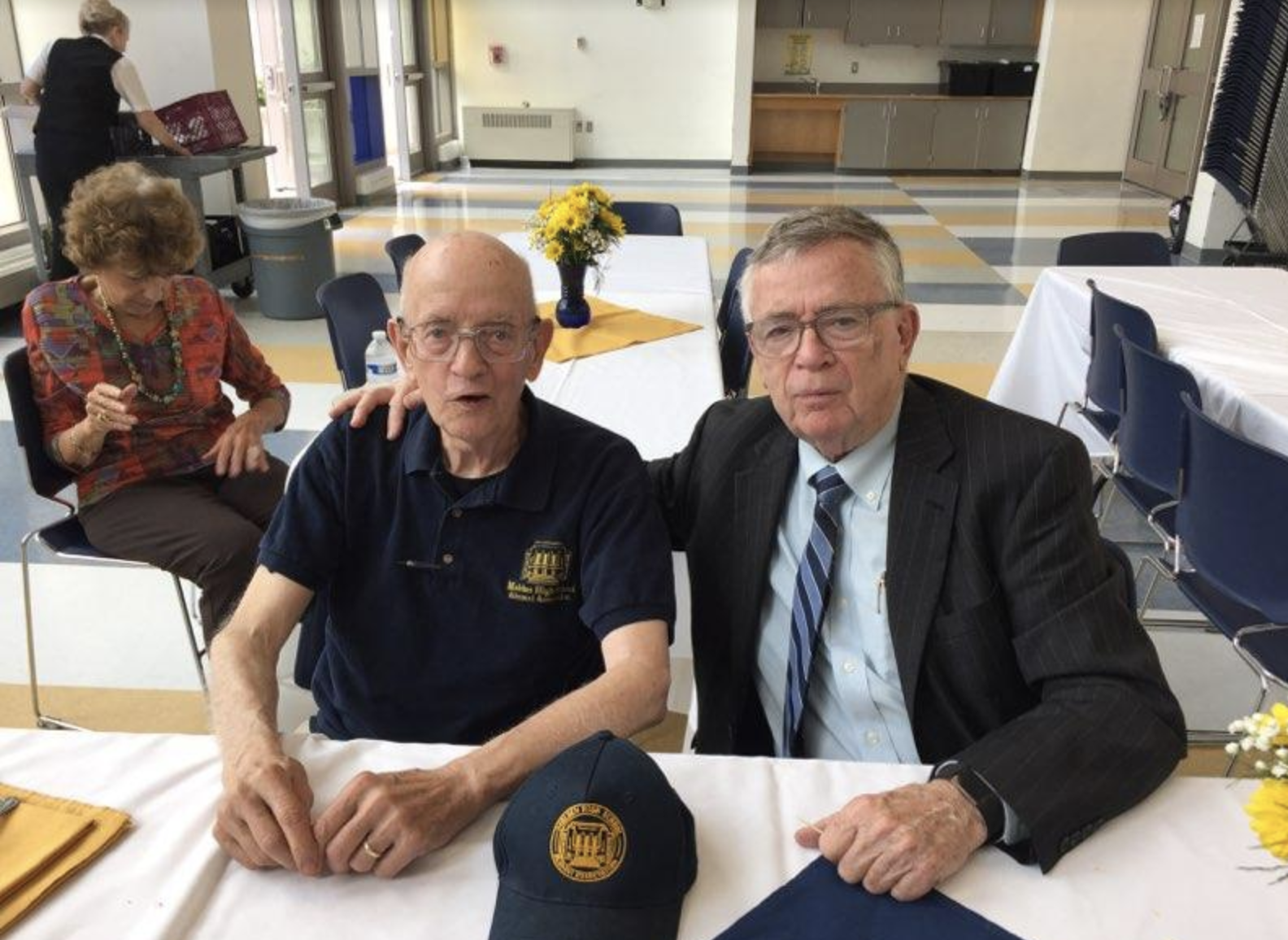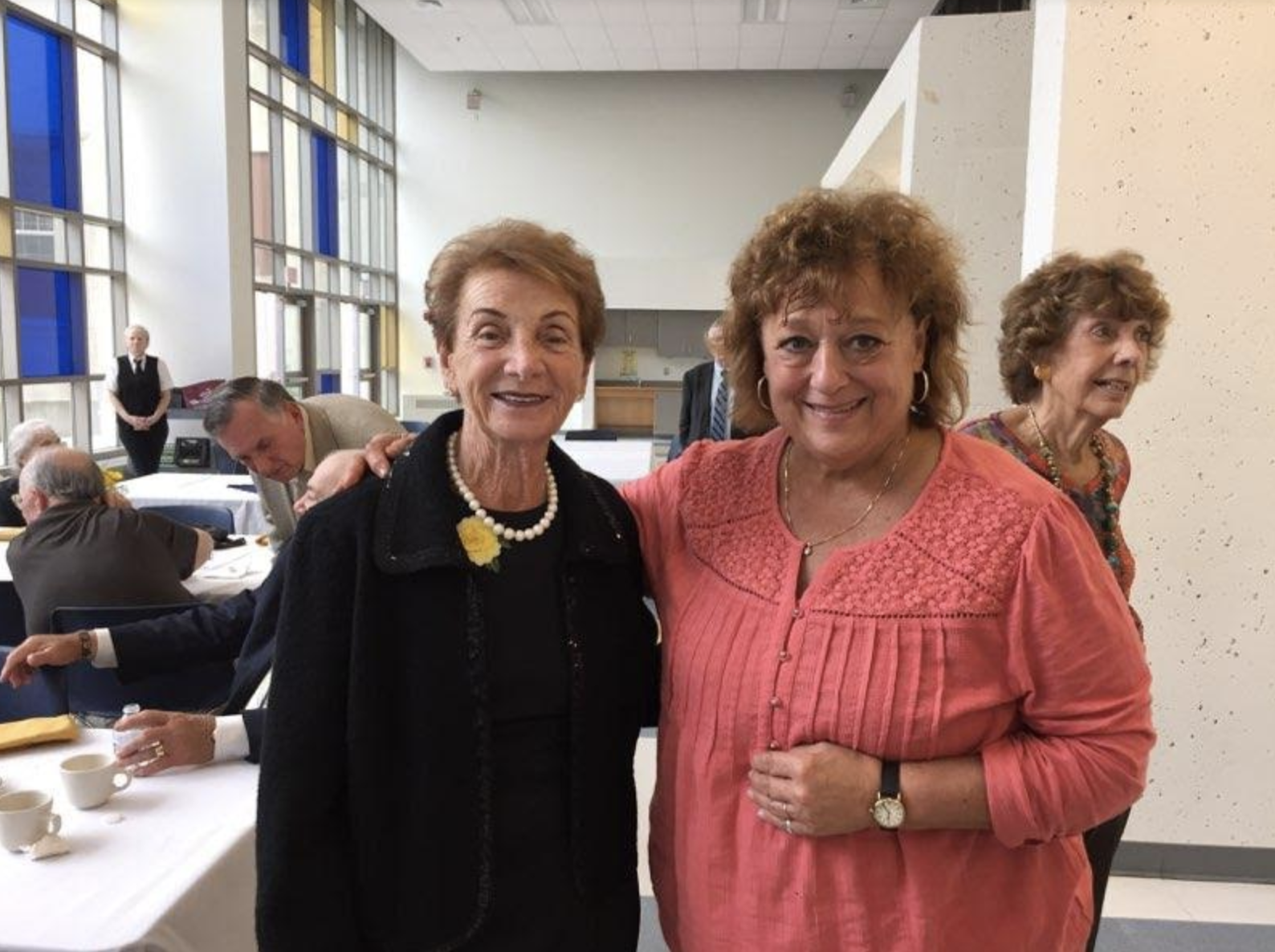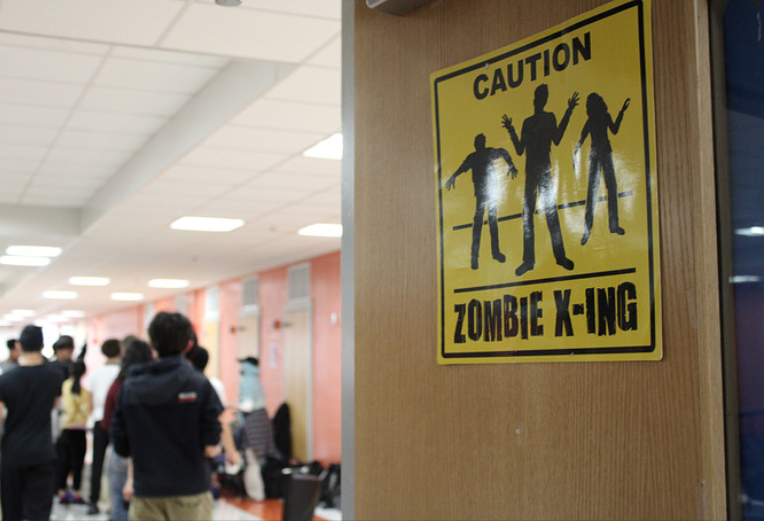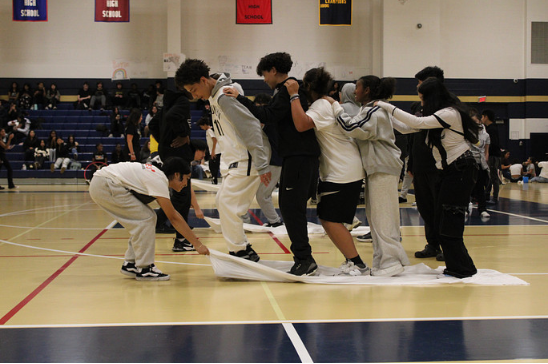Malden Alumni present at the lunch. Photo by Sara Zakaria.
Written by Sara Zakaria and Jemisha Syliant
On May 4th, the Malden High Alumni Association hosted their 4th Annual Hall of Fame luncheon and banquet. The luncheon took place in the Malden High gallery at 10:45, where the inductees and the officers of the Alumni Association had an informal lunch. They proceeded to take a tour of Malden High, and then went to the auditorium. The official banquet was held later on at 6:00, at Anthony’s, where seven inductees were given a formal ceremony.
The purpose of the Hall of Fame ceremony, according to the Alumni Association website, is to recognize MHS alumni for “exceptional achievement in their chosen careers” and for their “outstanding contributions to the Malden community and beyond.”
David Haskell, one of the original founders of the Alumni Association, was in charge of publicizing this year’s Hall of Fame through “newspapers and Facebook.” Haskell decided to become involved with the association because it was “one way to give back” to the community, to “advance the cause of education”, and to honor graduates who did “outstanding things in their careers.”
According to board member David Haskell, the seven inductees were chosen by nomination. The inductees had to be nominated by “a friend, colleague or family member”, which would lead to their “selection by a special committee”, which is “independent of the board of directors.” The inductees are also chosen by their contribution to several categories: government, arts, business, media, science, community service and education.

The inductees are Edmund Trabucco, Ann Carol Grossman, Diana Cataldo, Nicholas Robinson, and Noreen Grice. The last two inductees were posthumous; John Haynes Holmes and Joanne Iovino. Edmund Trabucco, class of 1934, was a Malden Police chief for over five decades. Ann Carol Grossman, class of 1965, is a documentary filmmaker best known for her film The Powder and the Glory, and is also the creator of Umbrella Films, a video production service. Diana Cataldo, class of 1958, is the co-founder and treasurer of Cataldo Ambulance. Nicholas Robinson, class of 1955, is known for being a “broadcasting legend”, who also opened the Connecticut School of Broadcasting. Noreen Grice, class of 1981, is a educator of astronomy and a planetarium manager, who also published five astronomy books and is the founder of You Can Do Astronomy LLC, an accessibility design and consulting company. John Haynes Holmes, class of 1898, was one of the founders of the National Association for the Advancement of Colored People (NAACP) and the American Civil Liberties Union (ACLU), and a Unitarian minister. He was also the recipient of the Gandhi Peace Award. Joanne Iovino, class of 1964, was the founder of the Malden High Alumni Association and the initiator of the Hall of Fame program. She was also a English teacher from 1968 to 2005.
Noreen Grice first heard that she was chosen to be an inductee on Facebook, which surprised her. She remembers “trying to post something for [her] job” and “everybody kept sending [her] messages”, which led her to see the posted announcement.
Grice’s interest in astronomy began when she attended Lincoln Elementary School, which is now Lincoln Park. She remembers the science fiction shows on television, particularly Star Trek, which made her “really interested in space.” By the time she came to MHS, she was “already interested in science”. Grice took an extra course of meteorology because she “thought that would be helpful.”
When Grice attended Malden High, she recalled that “everything was blue and gold.” Comparing Malden to now, she said that Malden Square has “really, really changed”. There were “never apartments in Malden Square”, and that was “just where the stores were” and one “just went shopping there”, but now, “it looks really different.”
Grice is an astronomer and educator, and has also worked in planetariums since 1984. Her books are written for “people who are blind or visually impaired.” The books feature pictures one can touch, so if “you can’t see the picture of Saturn or Jupiter”, one could instead “touch the rings of Saturn or the clouds of Jupiter”, which makes astronomy “accessible to everybody.” “Everybody could look at the colored picture and if you can’t see the colors, you could feel it”, she further explains. Grice has been living in Connecticut since 1988, but usually visits frequently.
Ann Carol Grossman recalls being ecstatic when she found out she was one of the inductees. Grossman said that she “love[s] Malden”, due to growing up here. She has still has “a ton of friends” that she attended Malden High with, whom she “get[s] together every year” and emails. Grossman said that her family goes “way back” to when her grandfather attended Malden High, and remarks that it is “nice that a lot of things have continued.”
Looking back at Malden High back then and comparing it to now, she said the school is “much more diverse” than when she was here. When Grossman was in high school, she said that Malden High was mostly into music, since “people were in the band, the orchestra, and choral arts.” She adds that the basketball team did “really well” when she was in high school. She remarks that a change that is positive for students now is that it is “a lot easier for girls to do a sport now.” She remembers that there was “a field hockey team”, but sports was not “a thing girls were encouraged to do.” Malden High “didn’t even have a pool”, so students had to swim at the YMCA.
Grossman recalls a time in college where her interest in documentaries began to grow. She originally was a sociology major, where she admits that she chose it “not because [she] was particularly interested in sociology”, but “mostly everyone was a sociology major in [her] class.” The professor then showed Night and Fog, a film made by Allen Renais, which is about the aftermath of the concentration camps. Grossman said that was “really the moment” that she chose that she was interested in documentary filmmaking. She adds that filmmaking in general is “not an easy career”, especially when it comes to documentary filmmaking. “If you’re able to raise the money to make the film, you want it to be on the screen”, Grossman said.
Grossman’s favorite aspect of filmmaking is that she always learns something “[she] did not know anything about” in each film she creates. Whenever she works on a documentary, she said that it is important to “know what you’re talking about”, so there has to be an extensive period of research, where one has to “really learn about that subject”, interview those involved, and “do a lot of reading about that subject.” The result of the research is that “there’s all kinds of stuff that [she] know about now” that she would have “never known about.” She adds that she worked on “environmental issues” for a long time, which expanded her knowledge.
The film that Grossman is most proud of is her documentary about the rivalry between cosmetic legends Elizabeth Arden and Helena Rubinstein, titled The Powder and the Glory. Arden and Rubinstein “basically founded the cosmetic industry”, and were rivals for fifty years. The rivalry only “made the business better”, since “if one of them thought the other one was going to do something better, than she was going to up her game to compete.” She reveals that she “sort of accidentally fell into doing this film”. The documentary premiered on PBS in 2009, and is shown on the channel every year ever since, particularly during Women’s History Month. The film also served as inspiration for the Broadway musical War Paint, which was nominated for several Tony Awards. Grossman said that the inspiration was “dizzying great”, since it rarely happens to filmmakers.



